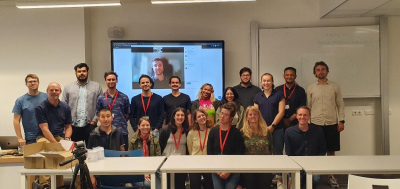Jewel Das
Report of GLOMAR PhD student Jewel Das about his participation in the Radboud Summer School Course “Process Tracing Methods in Practice” from 27 June to 1 July 2022
I participated in the summer school on process tracing methods held in the Radboud University, the Netherlands conducted by the Radboud Summer School team and MethodsNet from 26 June to 1 July 2022. This 5-day long course was taught by Professor Derek Beach, University of Aarhus, Denmark and Pieter Zwaan, Assistant Professor, Radboud University. This course addressed basics of process tracing theories and practices. It was a great experience in an in person classroom after a long COVID situation globally.
Before joining the course, the participants were enrolled in the summer school and became a registered member of a specific website (i.e. brightspace) designed for this summer school. I had some initial readings provided by the lecturers on this specific website. These readings followed by preparing arguments by the participants and submitting concepts before starting the course. The website was also prepared for content sharing, discussion, meeting participants and instructors beforehand, administrative issues, and information sharing etc.
This whole summer school was basically a 3 week program for social science researchers. I attended in the second week which was my target and learned about process tracing which is a core method of my research. Within five official days of the course, the instructors lectured about process tracing basics, cause and outcome, causal mechanisms, empirical fingerprints, evidence evaluation, mixed-methods and case selection.
Basically, after every lecture, there were group works and discussions on different cases of the world and their process tracing methods. Another interesting part of the discussion was presenting discussed thoughts with the whole class and receiving more feedback. I found these group discussions and interactions very useful because of sharing thoughts, perspectives and experiences from different disciplines and countries. These discussions and interactions also helped much to connect participants and build networks. In the afternoon of every day, there were some supplemental (not mandatory) classes on different social science issues, such as – different methods used in social science, dissertation presentations from some participants. I attended some other sessions as well, different from my course but useful for my research.
The contents, learning and timing of the course matched my current stage of PhD research as I am going to implement some of the techniques of process tracing I learned in this course, in my upcoming field work. About 20 participants of this course were from different disciplines and backgrounds. The range of academic and professional experiences of the participants were quite high including sociology, political science, natural science, law and urban development etc. This wide experience sharing among participants helped me immensely to conceptualize a few issues and perspectives from them in this regard.
Apart from academic works this course includes some social events like – quiz night, photo and video contests, welcome and farewell sessions and boat riding etc. Those helped to have some relaxing time for the participants. Importantly, also contributed to informal discussion among participants for further communication and network building. We, the participants, agreed to be in touch in future and formed a communication channel to share our experiences, learning and updating knowledge.
Finally, I found this course very useful to have insights on an issue which is very important for my research. I show my gratitude to the course instructors and participants to make the classes lively and facilitate building a potential network for future research. My gratitude to GLOMAR for funding me to join the course and enhance my knowledge in this regard.



